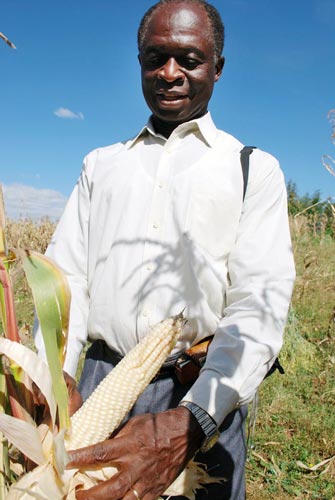 On 03 January 2013, 63-year-old Ghanaian-born maize breeder Strafford Twumasi-Afriyie succumbed to cancer, leaving a substantive legacy that includes the creation of the world’s most widely-sown quality protein maize (QPM) variety, Obatanpa. His demise represents a huge loss to family, friends, hundreds of colleagues and collaborators, and many thousands of farmers. A highly-committed and knowledgeable scientist, Twumasi is remembered by all for his kind, gentle demeanor and modesty, as well as for building strong partnerships.
On 03 January 2013, 63-year-old Ghanaian-born maize breeder Strafford Twumasi-Afriyie succumbed to cancer, leaving a substantive legacy that includes the creation of the world’s most widely-sown quality protein maize (QPM) variety, Obatanpa. His demise represents a huge loss to family, friends, hundreds of colleagues and collaborators, and many thousands of farmers. A highly-committed and knowledgeable scientist, Twumasi is remembered by all for his kind, gentle demeanor and modesty, as well as for building strong partnerships.
Twumasi worked at the Crops Research Institute (CRI), Ghana, through much of his career. Following the completion of his MSc at the University of Guelph, Canada, in 1981, he returned to Ghana to serve with former CIMMYT maize physiologist Greg Edmeades as Joint Coordinator of the Ghana Grains Development Project funded by the Canadian International Development Agency (CIDA). It was during this period and under the aegis of the GGDP that he used CIMMYT germplasm during the early 1990s to develop Obatanpa, which by 2005 was sown on more than half of Ghana’s maize area. With support from Sasakawa-Global 2000, the International Institute of Tropical Agriculture (IITA), and CIDA, Obatanpa has been released in numerous countries of Africa, including Uganda where as “Nalongo” it is among the most popular maize varieties.
Twumasi joined CIMMYT in 1997 to develop maize varieties for African highland areas in a project supported initially by the Federal Ministry for Economic Cooperation and Development, Germany and later the Ethiopian Institute of Agricultural Research (EIAR), CIMMYT, the Association for Strengthening Agricultural Research in Eastern and Central Africa (ASARECA), and CIDA. Releases from that effort are still gaining popularity in high-altitude zones of Ethiopia.
As a breeder in CIDAfunded research in Ethiopia beginning in 2003, Twumasi worked with EIAR to develop a QPM version of the hybrid BH660, which accounts for some 60% of seed sales in Ethiopia. These and other superior varieties developed are being promoted through the new “Nutritious Maize for Ethiopia” project that Twumasi was leading. “The National Maize Program recognizes the relentless work of Dr. Twumasi for small-scale farmers of Ethiopia in particular and Africa in general,” says Berhanu Tadesse, Ethiopia’s National Maize Research Coordinator.
Edmeades remembers Twumasi as scrupulously honest, slow to judgment but always fair, and one of nature’s true gentlemen. “He was not afraid to take risks as a scientist and promote QPM when many others declared it a lost cause,” says Edmeades. “As my counterpart in Ghana I very much enjoyed working with him and came to appreciate his wry sense of humor and his lovely smile.”
Twumasi’s mentorship and tutelage helped several maize researchers from the region develop as strong breeders in their own right. His academic background included a BSc in agriculture from the University of Ghana (1975) and a PhD in plant breeding from the University of Missouri, USA (1989).
The CIMMYT family extends its sympathies to Twumasi’s beloved wife, Veronica, his daughters Mame and Truelove, and his son Kwaku in this difficult time.
 Nutrition, health and food security
Nutrition, health and food security